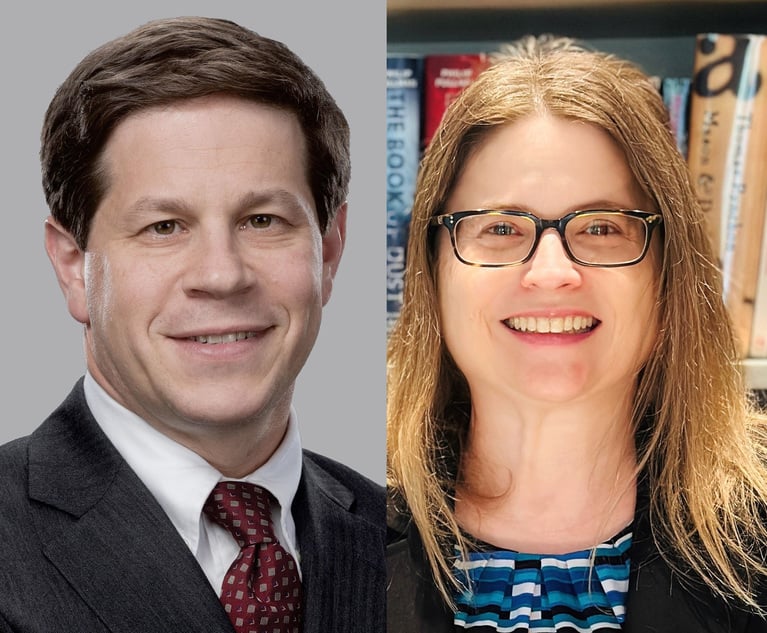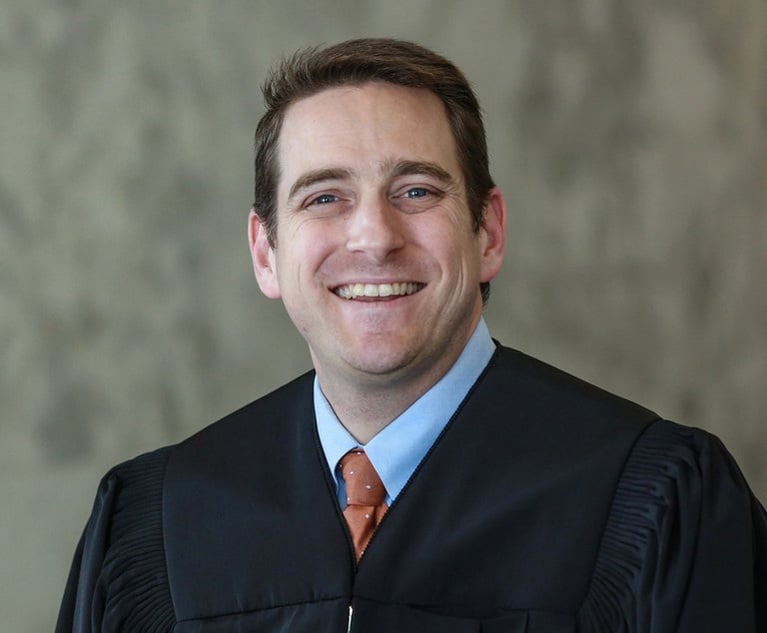Litigators of the Week: Proskauer Pair Win Watershed Decision in $125B Puerto Rico Bankruptcy
'The worst thing about litigating in what is significantly uncharted territory is the absence of jurisprudence interpreting PROMESA,' Mungovan and Bienenstock said. 'At the same time, the absence of guidance from the case law makes the engagement an exhilarating challenge.'
January 10, 2020 at 01:19 AM
12 minute read
 (L to R) Timothy Mungovan and Martin Bienenstock of Proskauer Rose (Photo: Courtesy Photo)
(L to R) Timothy Mungovan and Martin Bienenstock of Proskauer Rose (Photo: Courtesy Photo)
Our Litigators of the Week are Timothy Mungovan, who chairs Proskauer Rose's litigation department, and Martin Bienenstock, chair of the firm's business solutions, governance, restructuring and bankruptcy group.
The duo led a team in notching a watershed win before the U.S. Court of Appeals for the First Circuit in the $125 billion Puerto Rico debt restructuring—hands-down one of the biggest, most complicated and far-reaching cases around.
They discussed their work with Lit Daily.
Who is your client and what is at stake?
Timothy Mungovan and Martin Bienenstock: Our client is the Financial Oversight and Management Board for Puerto Rico. The United States Congress created the Oversight Board in 2016 when it enacted the Puerto Rico Oversight, Management, and Economic Stability Act (PROMESA) to address Puerto Rico's financial distress. It is not an overstatement to say that the economic future of Puerto Rico is at stake, as Congress found in PROMESA that Puerto Rico is in a fiscal emergency.
Set the stage. When and why did Puerto Rico declare bankruptcy? How does this proceeding compare to other bankruptcies?
By 2016, Puerto Rico was in dire fiscal condition, but as a territory of the United States, Puerto Rico could not seek traditional bankruptcy protection under Chapter 9. The Commonwealth had no cash flow to pay either debt service on $75 billion of bond debt or unfunded pensions of about $50 billion, and no ability to borrow additional amounts.
Congress enacted PROMESA to enable Puerto Rico to provide services to its residents, restructure its debts, and develop a method to achieve fiscal responsibility and access to the capital markets. PROMESA incorporates the Federal Rules of Bankruptcy and portions of the Bankruptcy Code in Title 11 to cases arising under Title III of the Act.
Importantly, Congress made a series of findings in PROMESA that most effectively "set the stage," including that "a combination of severe economic decline, and, at times, accumulated operating deficits, lack of financial transparency, management inefficiencies, and excessive borrowing has created a fiscal emergency," that "the Government of Puerto Rico has been unable to provide its citizens with effective services," and that "the fiscal emergency has also affected the long-term economic stability of Puerto Rico."
In 2017, the Oversight Board commenced cases under Title III of PROMESA, voluntarily petitioning for relief for the Commonwealth of Puerto Rico, and various of its instrumentalities, including the Highway & Transportation Authority, the Puerto Rico Electric Power Authority, the Puerto Rico Aqueduct and Sewer Authority, and the Employees Retirement System.
These are unprecedented cases and, as the First Circuit observed, represent "the largest proceeding to restructure debt in the history of the American municipal bond market."
In comparison to other bankruptcies, these cases add several dimensions. Instead of a debtor and various creditor and shareholder groups, we have creditors, the governor and the executive branch, two houses of the legislature, and the residents, often with different concerns and interests.
How did Proskauer get involved? What has the representation involved for the firm in terms of personnel/ resources/ hours?
The Oversight Board conducted a competitive process for selecting counsel, and chose Proskauer from a pool of 48 applicants. This representation is very important to Proskauer, principally because of the stakes involved. The economic future of the Commonwealth—and that of the three and a half million United States citizens who reside there—is in the balance.
Proskauer takes that responsibility very seriously, and we have committed substantial resources to supporting our client and working with and for the people of Puerto Rico. In terms of personnel, almost every practice at Proskauer has contributed to the engagement. There is, of course, significant litigation work, which is integral to our core focus of assisting the Commonwealth in restructuring its debts. The litigation team works side-by-side with our world class restructuring practice, led by Martin Bienenstock.
An overarching issue seems to be the struggle between the elected leaders of Puerto Rico and the federally-appointed Oversight Board over the Commonwealth's decision making on fiscal matters. Why is the board's ability to control fiscal planning and spending so important to help guide Puerto Rico out of its fiscal emergency?
The Oversight Board and the elected leaders of Puerto Rico have strived to work collaboratively to achieve PROMESA's goals. There have been times, however, where disagreements have arisen, particularly around authority with respect to fiscal planning and spending.
Congress itself determined that the board's ability to control fiscal planning and spending is essential to guide Puerto Rico out of its fiscal emergency. In fact, Congress found that "a comprehensive approach to fiscal, management, and structural problems and adjustments that exempts no part of the Government of Puerto Rico is necessary, involving independent oversight and a federal statutory authority for the Government of Puerto Rico to restructure its debts in a fair and orderly process."
The Oversight Board does not replace the government, but Congress recognized that change was necessary to reverse the negative economic growth of the prior decade, and gave fiscal authority to the Oversight Board.
Both the legislature and the governor filed lawsuits against the board in 2018. What were they objecting to?
Each lawsuit objected, essentially, to the board having final say over fiscal planning and budgets. At bottom, Puerto Rico's elected leaders contended that the Oversight Board had infringed the sovereignty of the Commonwealth's residents to make decisions—through their elected representatives—on how much to spend, and what to spend it on.
The governor's complaint challenged various aspects of the Commonwealth fiscal plan that the Oversight Board had certified in late June 2018. The governor contended that certain measures in the plan were merely recommendations that he could reject.
The legislature's complaint challenged the board's certified budget, which reduced spending by the legislative branch, and sought to replace the board's budget with the legislature's proposed budget.
The lower court ordered an expedited litigation schedule. What did that entail and what strategies did you use to manage the workload?
Pursuant to PROMESA, at the request of the governor and the legislature, the court entered an expedited litigation schedule that required complete briefing on motions to dismiss and oral argument in a little over two weeks in July 2018.
We prepared and filed four briefs (opening brief and reply) while handling numerous other litigation matters and court filings in the various Title III cases. The pressure was significant, not only because the board and the government urgently needed clarity on the fiscal plan and budgetary items, but also because these issues had never been litigated or addressed by any court.
We had teams of lawyers collaborating together around the clock so that work on the briefs never stopped until they were filed.
Tell us about the oral argument at the district court level. Who was opposing counsel? What did the judge focus on?
The oral arguments at the district court level had a serious and respectful tone, which reflected the gravity of the situation. The governor and the legislature argued the board was infringing the Commonwealth's sovereignty, while the board argued that Congress meant what it said in PROMESA and the board has final say on fiscal plans and budgets.
U.S. District Judge Laura Taylor Swain [of the Southern District of New York], who was designated by Chief Justice John Roberts to conduct these cases, presided at oral argument. Claudio Aliff was counsel for the [Puerto Rico] Senate and Israel Roldan Gonzalez was counsel for the House of Representatives. Peter Friedman and his colleagues at O'Melveny were counsel to the governor and the Puerto Rico Fiscal Agency and Financial Advisory Authority. Martin Bienenstock argued both motions for the Oversight Board.
Throughout the arguments, Judge Swain focused carefully on understanding the facts and circumstances and assessing the scope of the Board's authority under PROMESA. The arguments centered on legal principles and statutory construction.
We believed that Judge Swain got it right in dismissing the legislature's complaint in its entirety and dismissing the substance of the governor's complaint. The First Circuit agreed and affirmed both decisions on appeal, following argument by Tim Mungovan in both cases.
The First Circuit decided the legislature's case in February of 2019. What were the key takeaways?
The key takeaways from the First Circuit's decision in the legislature's appeal are that the board has significant control over fiscal planning and spending and the courts lack jurisdiction to consider challenges to the board's certification determinations.
As the First Circuit stated, in affirming the dismissal of the legislature's complaint, "PROMESA grants the board exclusive authority to certify Fiscal Plans and Territory Budgets for Puerto Rico. It then insulates those certification decisions from judicial review in section 106(e)."
Now, the First Circuit has affirmed dismissal of the governor's claims. What's notable about this latest decision?
The former governor took the position that he had the right to use funds that were appropriated in prior fiscal years—but apparently remained "unspent" —and spend them in the current fiscal year without the consent of the board.
The First Circuit agreed with Judge Swain that PROMESA expressly prohibits the governor from reprogramming funds without the board's consent. The First Circuit also endorsed Judge Swain's conclusion that PROMESA prohibits the governor from spending any funds that are not budgeted. Further, the First Circuit determined that nothing in PROMESA prohibits the Oversight Board from making a recommendation to the government under section 205 of PROMESA and then adopting even a rejected recommendation in a fiscal plan if it otherwise has the power to adopt the recommended action on its own.
Are your opponents in these cases—the legislature and governor—also sometimes your allies? Does that make litigation trickier?
The board is allied with the legislature and the governor on many initiatives, and the board has worked jointly and collaboratively with the government for several years now.
There is also significant mutual respect between them and all counsel. Proskauer works collaboratively every day with the in-house and outside lawyers for the governor and [Fiscal Agency and Financial Advisory Authority] on many aspects of these cases. While we obviously disagree over the litigation involving the governor and the legislature, we firmly believe that we are working collaboratively with them for the benefit of all stakeholders in Puerto Rico's future.
You've faced a lot of novel legal issues. What have been some of the best—and worst—things about litigating in uncharted territory?
The worst thing about litigating in what is significantly uncharted territory is the absence of jurisprudence interpreting PROMESA. There is literally no playbook, and yet we are advising the board every day on its rights, duties, and obligations under PROMESA.
At the same time, the absence of guidance from the case law makes the engagement an exhilarating challenge. We have the opportunity to inform the court's interpretation of PROMESA by showing how different interpretations will, or will not, carry out the Congressional intent and enable the board to achieve its statutory mission to restore fiscal responsibility and market access.
To what extent do you think the law that's being made now might be applicable in other matters one day in the future?
Particularly because PROMESA incorporates certain traditional bankruptcy provisions, the law being made in these cases will be relevant in current Title 11 bankruptcy cases as well as future restructurings of territories and, potentially, states and municipalities. The jurisprudence arising out of these cases deals with, among other things, the protections that the U.S. Constitution does and does not provide creditors, the scope and application of Uniform Commercial Code provisions, and the limits of federal court jurisdiction.
What do you hope will be the legacy of this work? Why is it so important—to both the people of Puerto Rico and the United States as a whole?
We hope the legacy of this work will be that Puerto Rico has a bright future and that the Oversight Board—whose members are dedicated and uncompensated—achieves Congress's mandate of restoring Puerto Rico's economic health for the benefit of the millions of American citizens living in the Commonwealth.
This content has been archived. It is available through our partners, LexisNexis® and Bloomberg Law.
To view this content, please continue to their sites.
Not a Lexis Subscriber?
Subscribe Now
Not a Bloomberg Law Subscriber?
Subscribe Now
NOT FOR REPRINT
© 2025 ALM Global, LLC, All Rights Reserved. Request academic re-use from www.copyright.com. All other uses, submit a request to [email protected]. For more information visit Asset & Logo Licensing.
You Might Like
View All
Litigators of the Week: Simpson Thacher and ACLU Team To Challenge Louisiana's Ten Commandments Law

A Reporter and a Mayor: Behind the Scenes During the Eric Adams Indictment News Cycle

Even With New Business Courts, Texas Is a Long Way from Taking Delaware's Corporate Law Mantle
5 minute readLaw Firms Mentioned
Trending Stories
- 1Justified Termination Does Not Bar Associate Attorney From Unemployment Benefits, State Appellate Court Rules
- 2Effective Termination Strategies in Today’s Troubled Condo Market
- 3AI and Land Use—a Perfect Match in Real Estate Heaven
- 4New Atlanta Litigation Firm Breaks Away From Swift Currie
- 5Florida Law Schools Are Seeing a Bump in Applications for 2025, After Recent Declines at Flagship Schools
Who Got The Work
J. Brugh Lower of Gibbons has entered an appearance for industrial equipment supplier Devco Corporation in a pending trademark infringement lawsuit. The suit, accusing the defendant of selling knock-off Graco products, was filed Dec. 18 in New Jersey District Court by Rivkin Radler on behalf of Graco Inc. and Graco Minnesota. The case, assigned to U.S. District Judge Zahid N. Quraishi, is 3:24-cv-11294, Graco Inc. et al v. Devco Corporation.
Who Got The Work
Rebecca Maller-Stein and Kent A. Yalowitz of Arnold & Porter Kaye Scholer have entered their appearances for Hanaco Venture Capital and its executives, Lior Prosor and David Frankel, in a pending securities lawsuit. The action, filed on Dec. 24 in New York Southern District Court by Zell, Aron & Co. on behalf of Goldeneye Advisors, accuses the defendants of negligently and fraudulently managing the plaintiff's $1 million investment. The case, assigned to U.S. District Judge Vernon S. Broderick, is 1:24-cv-09918, Goldeneye Advisors, LLC v. Hanaco Venture Capital, Ltd. et al.
Who Got The Work
Attorneys from A&O Shearman has stepped in as defense counsel for Toronto-Dominion Bank and other defendants in a pending securities class action. The suit, filed Dec. 11 in New York Southern District Court by Bleichmar Fonti & Auld, accuses the defendants of concealing the bank's 'pervasive' deficiencies in regards to its compliance with the Bank Secrecy Act and the quality of its anti-money laundering controls. The case, assigned to U.S. District Judge Arun Subramanian, is 1:24-cv-09445, Gonzalez v. The Toronto-Dominion Bank et al.
Who Got The Work
Crown Castle International, a Pennsylvania company providing shared communications infrastructure, has turned to Luke D. Wolf of Gordon Rees Scully Mansukhani to fend off a pending breach-of-contract lawsuit. The court action, filed Nov. 25 in Michigan Eastern District Court by Hooper Hathaway PC on behalf of The Town Residences LLC, accuses Crown Castle of failing to transfer approximately $30,000 in utility payments from T-Mobile in breach of a roof-top lease and assignment agreement. The case, assigned to U.S. District Judge Susan K. Declercq, is 2:24-cv-13131, The Town Residences LLC v. T-Mobile US, Inc. et al.
Who Got The Work
Wilfred P. Coronato and Daniel M. Schwartz of McCarter & English have stepped in as defense counsel to Electrolux Home Products Inc. in a pending product liability lawsuit. The court action, filed Nov. 26 in New York Eastern District Court by Poulos Lopiccolo PC and Nagel Rice LLP on behalf of David Stern, alleges that the defendant's refrigerators’ drawers and shelving repeatedly break and fall apart within months after purchase. The case, assigned to U.S. District Judge Joan M. Azrack, is 2:24-cv-08204, Stern v. Electrolux Home Products, Inc.
Featured Firms
Law Offices of Gary Martin Hays & Associates, P.C.
(470) 294-1674
Law Offices of Mark E. Salomone
(857) 444-6468
Smith & Hassler
(713) 739-1250







